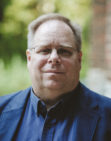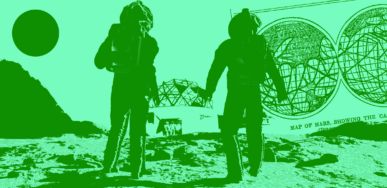Season 4, Episode 7: Ad Astra
Kurtis Schaeffer [00:00:00] I'm Kurtis Schaeffer.
Martien Halvorson-Taylor [00:00:01] And I'm Martien Halvorson-Taylor, and this is Sacred and Profane.
Kurtis Schaeffer [00:00:07] This episode is part of our ongoing series on climate change and religions in the United States. We call it Between Heaven and Earth. And the big question we've explored is how religion has shaped the way Americans think about and live on the land, and how the land has shaped religion.
Martien Halvorson-Taylor [00:00:25] But in this episode, we're going to turn our focus to the skies, not to some place as far away as Mars, but to our own atmosphere and the stars we can see beyond it.
Kelsey Johnson [00:00:38] It's really hard for me to imagine being able to go out and stare at the night sky night after night and not think about big questions and not ponder human existence…and not wonder what's out there or where it came from or what your place in the universe is.
Kurtis Schaeffer [00:00:59] That's our colleague, Kelsey Johnson. She joined us in an earlier episode to trace the history of Mars as a kind of second earth in Americans’ imagination.
Kelsey Johnson [00:01:09] My name is Kelsey Johnson. I'm an astronomer and a professor at the University of Virginia.
Martien Halvorson-Taylor [00:01:15] Kelsey watches the night sky professionally now, but she got into the habit long ago growing up in rural Minnesota.
Kelsey Johnson [00:01:25] We lived in this tiny little postage stamp house that was literally like on the edge of a potato field. And then behind our house there was a big meadow. And because, you know, we really were—it was just my mom and I, but it was really very crowded and not always the most fun place to be. So whenever I could, as long as the weather was permitting, and sometimes even when it wasn't, there was one particularly bright star that, when I was outside at night, was always in about the same place…and I just came to expect it to be there, and I would look for it night after night. And it almost—this is going to, I realize this sounds completely ridiculous, but it almost became like a, like a friend, like a loyal friend that I knew was going to be there every single night when I went outside. I took it for granted as something that people could do, that you could just go outside at night and look at the stars.
Kurtis Schaeffer [00:02:22] People have been looking up at the night sky for an awfully long time. And many of the most enduring records we have of the night sky come to us through religion—creation myths, calendars, even sites like Stonehenge—all point to our fascination with the moon and stars.
Kelsey Johnson [00:02:41] Both of our disciplines really speak to, from different perspectives, humanity's place in the universe in the face of things that are unfathomable and defy comprehension. How do you think, or do you think, human religions would have developed differently if our distant ancestors, you know, going back millennia, had never had access to a night sky—like imagine earth such that we never had a dark night sky.
Martien Halvorson-Taylor [00:03:17] Mm hmm. There was. If there was nothing to look up at.
Kelsey Johnson [00:03:20] Yeah, there was nothing to look up at.
Kurtis Schaeffer [00:03:23] Honestly, it's hard to imagine religion without the night sky. Yeah, I just think it's all the, the major metaphors for existence beyond the bounds of human life, beyond the bounds of human capacity to understand, or even to imagine. They're all about the heavens. All the metaphors are about the sky, the stars.
Martien Halvorson-Taylor [00:03:54] Yeah. And then, you know, on a very concrete level, it's not only, as Kurtis says, a basic metaphor, but all of the creation myths in every religion deal with cosmos. It's the starting point.
Kelsey Johnson [00:04:10] I kind of want to read this speculative fiction novel now, right? How would humanity have developed differently? If all you ever had was sort of a featureless blue sky, which could understandably give one the impression that this planet is all there is. Right? What if we only thought this is all there was and all there ever will be, and all there ever has been?
Martien Halvorson-Taylor [00:04:40] But that millennia long relationship with the night sky is changing rapidly as the world urbanizes, our nights are growing brighter at a rapid clip.
Kelsey Johnson [00:04:54] So it's interesting because where I live here in Virginia, actually, we…we bought a house that's in the sort of pocket of darkest night sky that you can get in central Virginia. So where I live, I can still see the Milky Way, but that is exceedingly rare. And even from my house, I fear that that is going to disappear in my time living there. Can you see the Milky Way from your house?
Kurtis Schaeffer [00:05:22] I remember telling you once, I was so happy when I moved from Alabama to Virginia because the town that I lived in, in Alabama, which was smaller than this, had much more light pollution. (Kelsey: Hmm.) My university's stadium lights were on 24/7. (Kelsey: ugh.) And it was like it was daytime in our town all of the time. Yeah. Or like, I lived in a big parking lot, even though I lived in a relatively small town. So here I was so happy. And you looked at me with this sort of pitying look. You think this is dark sky?
Kelsey Johnson [00:05:59] And I'm actually pretty late to the game. There are a lot of people who have been working on this for a very long time. But over the last decade, especially since moving to the East Coast, I've become more aware of how much of our population lives under really extreme light pollution. And I've gotten increasingly concerned about the impact that has on one's worldview and how you see yourself in the universe, how you see yourself in terms of your own significance, what you worry about on a daily basis. So I've just gotten, um, I've gotten really worried about our connection to the night sky and that we've lost it. It's something we've had…you know, our connection to the night sky has been around for millennia, right? Like, literally since the dawn of humankind, we have used the night sky, and looked at the night sky, and been connected to the night sky. And in the last hundred years, we've almost completely lost that. And we've lost it on a timescale that's slow enough that people don't necessarily notice it disappearing. But now, if you live—and you know, any environment that's urban or suburban if you even spend any time outside at night, which I think is becoming increasingly rare, but even if you are outside at night, and you take a minute to look up at the sky, you're not going to see anything. You know, maybe you'll see the moon or maybe the, the few brightest stars, but nothing that's going to leave you awestruck and wanting more of it because it's just not there, and you may not even know what you're missing.
Martien Halvorson-Taylor [00:07:52] And so, I mean, what do you say to the people who say, well, I mean, I lived in the city and, you know, I can see the… I can see stars.
Kelsey Johnson [00:08:02] I say that they don't know what they're missing. Right. People who have never seen a truly dark night sky really just don't know what they're missing. It's, it's like if someone tried to describe chocolate to you and you're like, can imagine chocolate. I've had sugar, and it's just not the same. The universe is in your face when you're in a truly dark night sky.
Kurtis Schaeffer [00:08:31] It might not be obvious to us why there's a connection between light pollution and climate change. And can you help us understand those, the connection between those two human-made phenomenon?
Kelsey Johnson [00:08:48] So climate change and light pollution go hand in hand for a couple different reasons. One is simply all of that light that is polluting the night sky and bouncing around and making this glowing smog…all of that light pollution that's literally being wasted comes with an energy cost and a real financial cost. Only the light that's being wasted—so literally only the light that is, like, going off into the universe and not helping anyone—is the equivalent of about 15 million tons of CO2 every year. And I know that that is, you know, okay, 15 million sounds like a big number. But put that in context, right? That would take about 600 million trees planted every year to offset. And if you needed to plant 600 million trees every year, where are you going to do that? And so to plant 600 million trees, you would need an area of ten times Rhode Island. So of course, there's, there's a huge energy cost to light pollution. There's also a financial cost to light pollution—in the U.S. alone it costs about $3 billion a year to, you know, pay for that light that's not doing anyone any good. You know, the other aspect of light pollution that I think is really affecting things, in this low-key way that I think people are just not aware of, is that light pollution affects every single type of plant and animal species that has been studied to date. All the flora and all the fauna has evolved over millions of years to have this circadian rhythm and be in tune with when the sun rises and the sun sets. And when there's too much light at night, it actually throws off the circadian rhythm of all of the flora and fauna that have been studied that live on the surface of our planet. And this has snowballing effects that then affect entire ecosystems. Right. So we're throwing entire ecosystems out of whack simply because they don't have dark skies at night.
Martien Halvorson-Taylor [00:11:08] The solution to this type of light pollution is within our grasp to use fewer, less powerful lights at night, and to aim them towards the ground rather than the sky. And there has been some limited progress made in this direction. We reported stories from Flagstaff and Sedona, Arizona, two cities in a growing number across the U.S. who have committed to keeping their skies dark at night. But there's another source of pollution that is cutting us off from the night sky, one that's harder to fix from here on the ground.
Kelsey Johnson [00:11:43] Okay, so let me set the stage here a little bit. Even from the darkest location on earth, you could go to Antarctica. The human eye, even from the darkest location on Earth, can only see typically about 5000 stars. You may actually be surprised by the number. A lot of people just think it must be like millions of stars. But actually your eye, if you have a normal human eye, can see about 5000 stars. For comparison, as of today, there are almost 10,000 active satellites in earth orbit around the globe, and this number has more than doubled in the last five years, and continues to grow literally exponentially. Right now, more than half of these satellites are from the StarLink company alone. And you don’t even need special equipment to see most of these satellites. Just a dark enough sky. I think many people have the experience of—if they do go outside on a on a dark night and they're staring up at the sky, they'll see this, you know, small speck of light moving across the sky, and it will be a satellite. And that's actually kind of fun when there are only just a few of them out there. So as of the last time I checked, there are over 400,000 individual satellite applications from satellite constellations into the International Telecommunications and the Federal Communications Commissions. You know, let's say half of those don't come to fruition for whatever reason. Only, you know, we're still talking about a quarter million satellites in orbit around Earth. And even if a fraction of those are bright enough to be seen by the human eye, there will be more satellites whizzing around the sky that you can see than actual stars. And so now, to me, this is utterly dystopian, right? We will be literally surrounded by a web of satellites blocking off our access to the night sky. But it's worse than that, too. So these satellites, you know, most of them do fine and they orbit where they're supposed to orbit. But things go wrong, right? There are always going to be mistakes and errors. What happens is slowly these satellites, one at a time, perhaps, run into something, and they have a collision, and then we have debris. And that debris then becomes little pieces of shrapnel orbiting the earth. And that debris hits other satellites, and then those satellites go defunct. And then they make more debris. And the next thing you know, all we have around Earth is a debris field. This does a couple of things. One, it increases the overall sky glow globally. So no matter where you are on earth, whether you are on Antarctica under a pristine, dark night sky, the overall sky glow is forecast by some estimates to go up by 250%. So nowhere on the globe will have access to a dark night sky. The second thing that's going to happen is the debris that's in low earth orbit is slowly getting dragged on by the atmosphere. And as it gets dragged on by the atmosphere, it slows down. And as it slows down, it does what we call, it deorbits, which means it crashes back down into the atmosphere. And, you know, if pieces are big enough or sturdy enough, they would land on the ground. But now we have another problem. Not only are we going to lose access to the night sky, you know, both on ground and in space, we're looking at massive chemical deposition in the upper atmosphere, which maybe, you know, maybe it won't, but maybe it will trigger an environmental catastrophe because it hasn't been studied. And we're looking at a debris field from satellites in Earth orbit that we can't launch through. That means we can't actually get a rocket through space because you can't launch through a debris field safely, without risking destroying whatever it is you're launching. And so we're looking at basically grounding ourselves on Earth without access to the cosmos for generations to come.
Kurtis Schaeffer [00:16:12] To lose that connection to the night sky, for generations in that worst case scenario, could have all sorts of consequences that we cannot foresee. One thing to think about is that this may have spiritual consequences. The skies are what give people a sense of something larger than themselves. The skies can even help us to feel awe at the transcendent, an experience of something so vast that it exceeds our ability to capture it with words.
Kelsey Johnson [00:16:40] I have learned so much interacting with folks from religious studies in terms of thinking about how humans think about our place in the universe and the stories we tell ourselves. And how we take lived experiences and translate those into religious or spiritual realities. And one of the places where I think that happens, it's hard to not have a spiritual experience when you are experiencing awe. And so there's something about coming face to face with the universe that just strikes me as being fundamentally a spiritual experience. For me, the sky always offered, I think, different things that I needed as a human. It offered solace. It offered a sense of connection to the universe. It offered a sense of place, a sense of being, and also made me feel kind of important. You know, so you can be in the face of the universe. And yes, on some very real scale, you are utterly insignificant. And whatever you do really doesn't matter. But on the other hand, here you are witnessing the universe, and there's something really profoundly empowering about that, that, at least for me, made me feel like I had value and worth and importance and a connection to this thing that was much bigger than me.
Kurtis Schaeffer [00:18:35] Sacred and Profane was produced for the Religion, Race, and Democracy Lab at the University of Virginia. This episode was made possible by a grant from the National Endowment for the Humanities. Our senior producer is Emily Gadek. We were joined by our colleague Kelsey Johnson.
Martien Halvorson-Taylor [00:18:52] Music for this episode comes from Blue Dot Sessions. You can find out more about our work at religionlab.virginia.edu.
Millions of Americans are traveling hundreds of miles for a chance to witness 2024’s total solar eclipse. As many eyes turn towards this rare event, we’re turning our attention to another wonder, one we sometimes take for granted: the night sky. Humans have a relationship with the moon and stars stretching back for millennia. Observing the night sky has given us practical things, like calendars and ways to navigate; but they also give us a sense of awe and wonder that can’t be replicated. We’re joined once more by our colleague Kelsey Johnson to talk about how the night sky links us to the wider universe, and how pollution coming from land and space is threatening that ancient link.
Additional Credits
This episode was made possible by a grant from the National Endowment for the Humanities. Special thanks to Rebecca Bultman, Erin Burke, and Devin Zuckerman for their help on production. Kelsey Johnson and Erin Burke contributed to the reporting of this episode.






